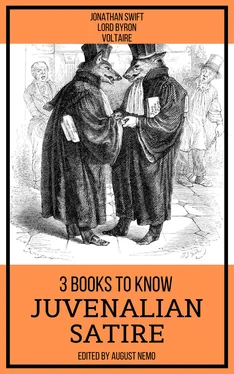Look up to thine and to thy Son's above!
Ave Maria! oh that face so fair!
Those downcast eyes beneath the Almighty dove—
What though 't is but a pictured image?—strike—
That painting is no idol,—'t is too like.
Some kinder casuists are pleased to say,
In nameless print—that I have no devotion;
But set those persons down with me to pray,
And you shall see who has the properest notion
Of getting into heaven the shortest way;
My altars are the mountains and the ocean,
Earth, air, stars,—all that springs from the great Whole,
Who hath produced, and will receive the soul.
Sweet hour of twilight!—in the solitude
Of the pine forest, and the silent shore
Which bounds Ravenna's immemorial wood,
Rooted where once the Adrian wave flow'd o'er,
To where the last Caesarean fortress stood,
Evergreen forest! which Boccaccio's lore
And Dryden's lay made haunted ground to me,
How have I loved the twilight hour and thee!
The shrill cicadas, people of the pine,
Making their summer lives one ceaseless song,
Were the sole echoes, save my steed's and mine,
And vesper bell's that rose the boughs along;
The spectre huntsman of Onesti's line,
His hell-dogs, and their chase, and the fair throng
Which learn'd from this example not to fly
From a true lover,—shadow'd my mind's eye.
O, Hesperus! thou bringest all good things—
Home to the weary, to the hungry cheer,
To the young bird the parent's brooding wings,
The welcome stall to the o'erlabour'd steer;
Whate'er of peace about our hearthstone clings,
Whate'er our household gods protect of dear,
Are gather'd round us by thy look of rest;
Thou bring'st the child, too, to the mother's breast.
Soft hour! which wakes the wish and melts the heart
Of those who sail the seas, on the first day
When they from their sweet friends are torn apart;
Or fills with love the pilgrim on his way
As the far bell of vesper makes him start,
Seeming to weep the dying day's decay;
Is this a fancy which our reason scorns?
Ah! surely nothing dies but something mourns!
When Nero perish'd by the justest doom
Which ever the destroyer yet destroy'd,
Amidst the roar of liberated Rome,
Of nations freed, and the world overjoy'd,
Some hands unseen strew'd flowers upon his tomb:
Perhaps the weakness of a heart not void
Of feeling for some kindness done, when power
Had left the wretch an uncorrupted hour.
But I 'm digressing; what on earth has Nero,
Or any such like sovereign buffoons,
To do with the transactions of my hero,
More than such madmen's fellow man—the moon's?
Sure my invention must be down at zero,
And I grown one of many 'wooden spoons'
Of verse (the name with which we Cantabs please
To dub the last of honours in degrees).
I feel this tediousness will never do—
'T is being too epic, and I must cut down
(In copying) this long canto into two;
They 'll never find it out, unless I own
The fact, excepting some experienced few;
And then as an improvement 't will be shown:
I 'll prove that such the opinion of the critic is
From Aristotle passim.—See poietikes.
––––––––

Nothing so difficult as a beginning
In poesy, unless perhaps the end;
For oftentimes when Pegasus seems winning
The race, he sprains a wing, and down we tend,
Like Lucifer when hurl'd from heaven for sinning;
Our sin the same, and hard as his to mend,
Being pride, which leads the mind to soar too far,
Till our own weakness shows us what we are.
But Time, which brings all beings to their level,
And sharp Adversity, will teach at last
Man,—and, as we would hope,—perhaps the devil,
That neither of their intellects are vast:
While youth's hot wishes in our red veins revel,
We know not this—the blood flows on too fast;
But as the torrent widens towards the ocean,
We ponder deeply on each past emotion.
As boy, I thought myself a clever fellow,
And wish'd that others held the same opinion;
They took it up when my days grew more mellow,
And other minds acknowledged my dominion:
Now my sere fancy 'falls into the yellow
Leaf,' and Imagination droops her pinion,
And the sad truth which hovers o'er my desk
Turns what was once romantic to burlesque.
And if I laugh at any mortal thing,
'T is that I may not weep; and if I weep,
'T is that our nature cannot always bring
Itself to apathy, for we must steep
Our hearts first in the depths of Lethe's spring,
Ere what we least wish to behold will sleep:
Thetis baptized her mortal son in Styx;
A mortal mother would on Lethe fix.
Some have accused me of a strange design
Against the creed and morals of the land,
And trace it in this poem every line:
I don't pretend that I quite understand
My own meaning when I would be very fine;
But the fact is that I have nothing plann'd,
Unless it were to be a moment merry,
A novel word in my vocabulary.
To the kind reader of our sober clime
This way of writing will appear exotic;
Pulci was sire of the half-serious rhyme,
Who sang when chivalry was more Quixotic,
And revell'd in the fancies of the time,
True knights, chaste dames, huge giants, kings despotic:
But all these, save the last, being obsolete,
I chose a modern subject as more meet.
How I have treated it, I do not know;
Perhaps no better than they have treated me
Who have imputed such designs as show
Not what they saw, but what they wish'd to see:
But if it gives them pleasure, be it so;
This is a liberal age, and thoughts are free:
Meantime Apollo plucks me by the ear,
And tells me to resume my story here.
Young Juan and his lady-love were left
To their own hearts' most sweet society;
Even Time the pitiless in sorrow cleft
With his rude scythe such gentle bosoms; he
Sigh'd to behold them of their hours bereft,
Though foe to love; and yet they could not be
Meant to grow old, but die in happy spring,
Before one charm or hope had taken wing.
Their faces were not made for wrinkles, their
Pure blood to stagnate, their great hearts to fail;
The blank grey was not made to blast their hair,
But like the climes that know nor snow nor hail
They were all summer: lightning might assail
And shiver them to ashes, but to trail
A long and snake-like life of dull decay
Was not for them—they had too little day.
They were alone once more; for them to be
Thus was another Eden; they were never
Weary, unless when separate: the tree
Cut from its forest root of years—the river
Damm'd from its fountain—the child from the knee
And breast maternal wean'd at once for ever,—
Would wither less than these two torn apart;
Alas! there is no instinct like the heart—
The heart—which may be broken: happy they!
Thrice fortunate! who of that fragile mould,
The precious porcelain of human clay,
Break with the first fall: they can ne'er behold
The long year link'd with heavy day on day,
And all which must be borne, and never told;
While life's strange principle will often lie
Deepest in those who long the most to die.
'Whom the gods love die young,' was said of yore,
Читать дальше













